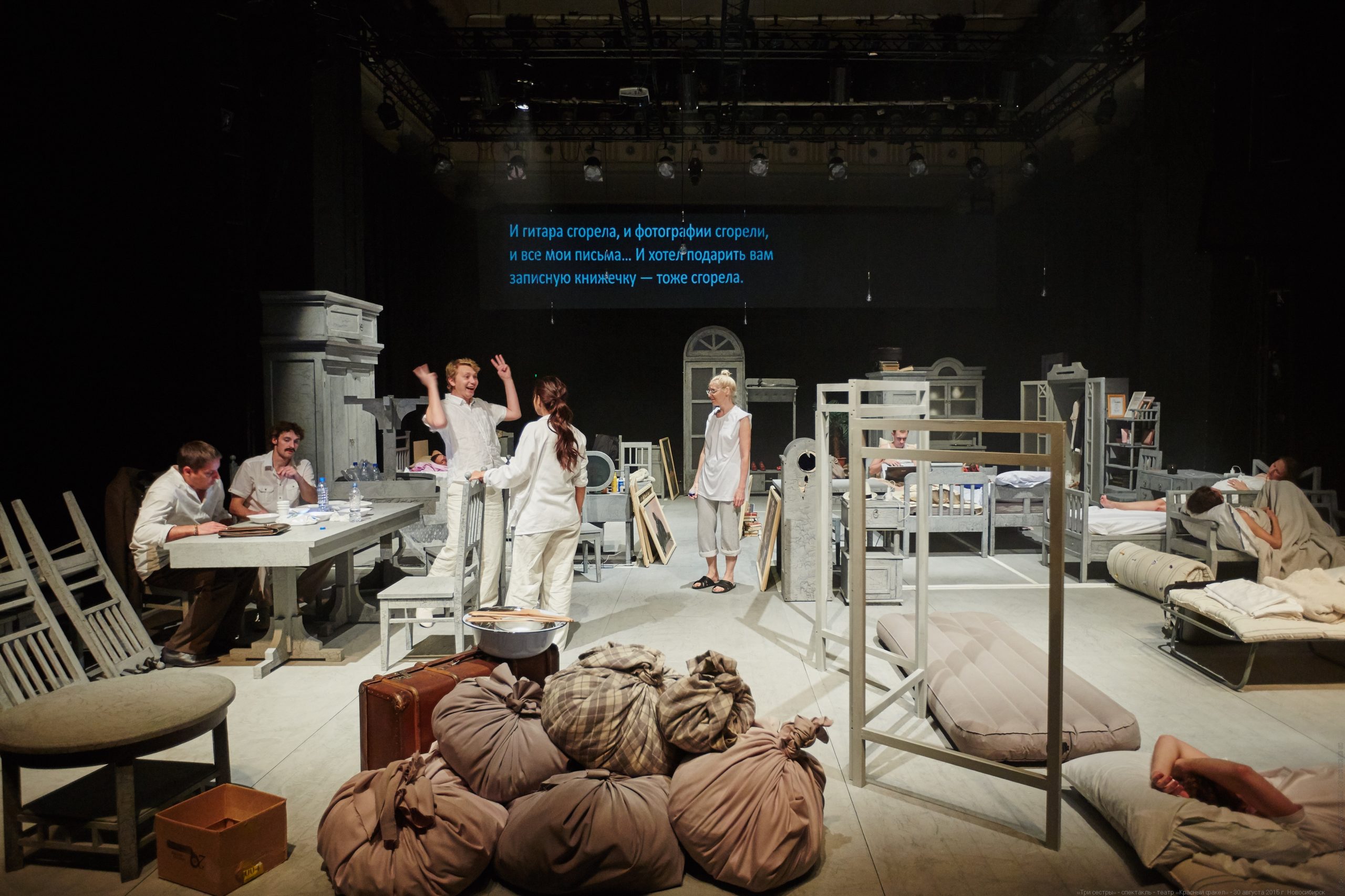
‘Three Sisters’ by Anton Chekhov
Directed by: Timofey Kulyabin
Stage design: Oleg Golovko
Lighting: Denis Solntsev
Sign language instructor: Galina Nishchuk
Advisers on Deaf Culture: Veronika Koposova & Tamara Chatula
Cast: Konstantin Telegin, Ilya Muzyko, Anton Voinalovich, Claudia Kachusova, Valeria Kruchinina, Irina Krivonos, Linda Akhmetzyanova, Daria Emelyanova, Denis Frank, Alexei Mezhov, Pavel Polyakov, Andrei Chernykh, Sergey Bogomolov, Sergey Novikov & Elena Drinevskaya
Timofey Kulyabin has made the entire Prozorov family, those who share their household and those who visit them deaf, with the cast studying sign language for a year-and-a-half. All of Chekhov’s text is translated on the subtitle panels above the stage, occasionally with clarifications à la “Vershinin: ‘Buzz-buzz, beep-beep’ (SMS)” when the soldier wants to let Masha know that he is beside her. Yes, the heroes of the tale wield mobile phones and tablets, while Andrei turns his computer on to an amplified Windows fanfare and Irina watches clips on television – but beyond these examples, no other aspects of modernity have been forced upon the production. Indeed, many of the actors wear costumes in period style and all of them drink tea from a samovar. Deliberately depriving Chekhov’s heroes of hearing seems a strange paradox: the play is about what they hear, after all, but they are unable to hear one another; ergo, the strength of this central idea should be significantly impacted. Surprisingly, however, this does not occur. The fact that the characters communicate in the language of gesture energises the performance: there is no trace of the ‘withered’ Chekhov. Conversations are filled with movement; the actors have to maintain eye contact whenever they ‘talk’ and make sure the attention is on them; so as to be ‘heard’ they must physically intervene to slow the furious pace at which others are ‘speaking’. It feels as though Chekhov has never been as tactile as here, where direct contact is unavoidable.
This is by turns a very quiet and a very boisterous production: there is a great deal of movement, and a great deal of fun is had, with people even dancing. (Deaf people still feel the vibration and rhythm of music, after all.) Laughing, crying, screaming, scandalising – all this happens virtually without voice, but very much in the open, as though deafness adds a sharper edge to everything, including mimicry. Beyond that, all that is left is to talk about The Three Sisters, albeit as a phenomenon that might be said to look at things in a new way.
Ekran i stsena newspaper
The duration of the play is 4 hours and 30 minutes (with two intermissions)
You must be at least 16 to enter.
Note: The play is in sign language with Russian and Estonian subtitles.
‘Golden Mask Estonia’ in 2005 was the first in the long-running festival series to be held outside of Russia. It now takes place in Estonia each year.
The festival is the highlight of the cultural calendar, attracting both Russian- and Estonian-speaking audiences and showcasing the best Russian productions from recent seasons – both nominated for and recipients of Russian Golden Mask awards. All performances feature simultaneous translation into Estonian. Seminars, master classes and lectures are also held as part of the festival.
The event helps to strengthen lasting cultural ties between the countries and provides a platform for creative networking among people in the theatre. Audiences, the media and the world of theatre in general have shown great interest in the festival, which is organised jointly by the Ministries of Culture of Russia and Estonia with the support of Tallinn City Government. Assistance is also provided by the embassies of both countries and the Cultural Endowment of Estonia.